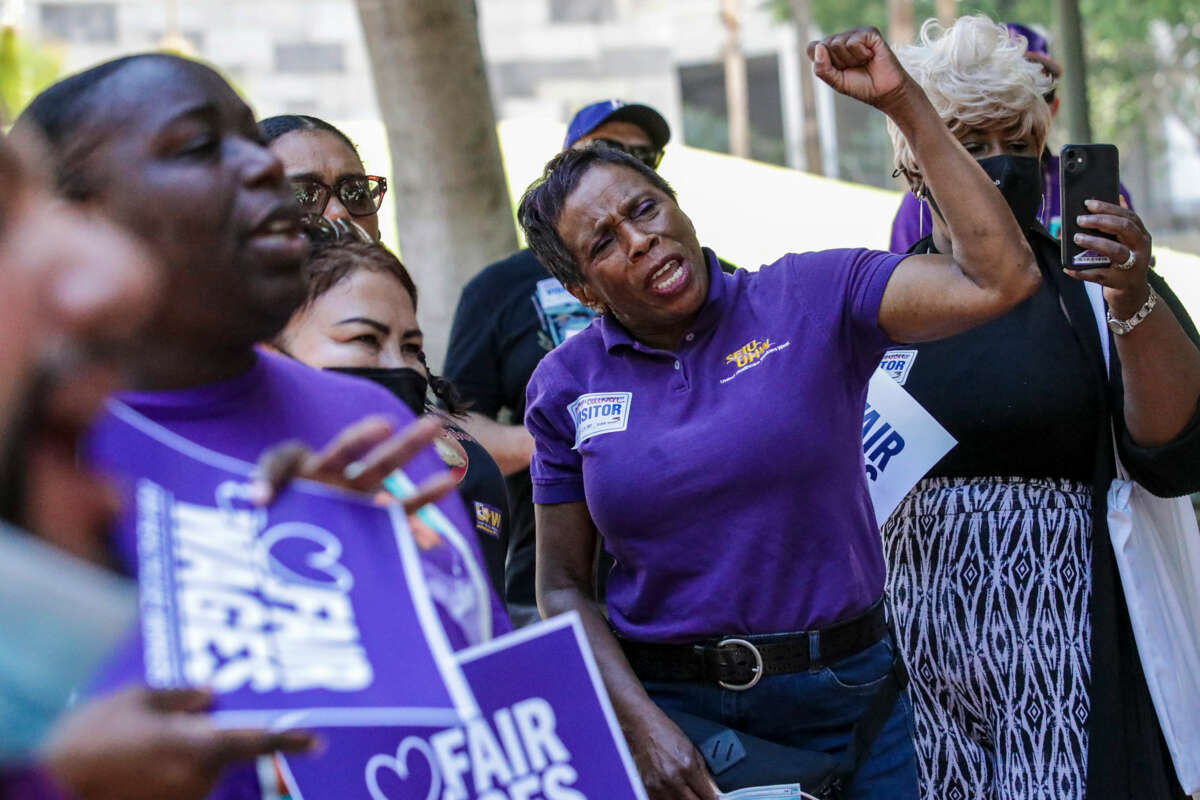Union-aligned Democrats were set to introduce legislation Wednesday mandating a statewide $25 minimum wage for health workers and support staffers, likely setting up a pitched battle with hospitals, nursing homes, and dialysis clinics.
State Sen. María Elena Durazo’s bill would require health facilities and home health agencies to give raises to many support employees, including nurse technicians, housekeepers, security guards, food workers, and laundry providers. The Los Angeles Democrat said workers remain underpaid even as they have played a crucial role in the covid-19 pandemic. Now, she argued, many who earn close to the state’s $15.50 minimum wage struggle with inflation.
“How do people survive?” Durazo told KHN ahead of the bill’s introduction. “They can’t be on the edge of becoming homeless. That’s what we’re facing.”
While the bill is backed by the influential Service Employees International Union-United Healthcare Workers West, which represents roughly 100,000 workers statewide, similar proposals have previously faced strong opposition from the health industry.
If lawmakers approve the bill and Gov. Gavin Newsom signs it, one labor leader estimated, 1.5 million California workers could get a wage hike come January 2024.
Last year, the union spent about $11 million to promote local $25 minimum wage measures in 10 Southern California cities while hospitals and health care facilities spent $12 million against them. That fight yielded an opposite decision in November in two cities where the measure made the ballot: Inglewood voters approved raises at private hospitals and dialysis clinics, while voters in Duarte rejected the wage hike.
During the campaign, a ballot issue committee with funding from Kaiser Permanente of Northern California, Adventist Health, Cedars-Sinai, Dignity Health, and other hospitals and health systems warned that a $25 minimum wage would raise their costs.
Earlier this month, the California Hospital Association launched a campaign to ask lawmakers for an extra $1.5 billion in the state budget for Medi-Cal, the state’s insurance program for people with low incomes and disabilities. In a Feb. 9 memo, Carmela Coyle, the association’s president and CEO, wrote that hospitals need urgent financial relief, citing inflation and mounting costs: “Help is needed — immediately.”
Meanwhile, the nursing home industry has said it wants to pay workers more but can’t because the state reimburses them too little for patients enrolled in Medi-Cal. And the dialysis industry has shelled out more than $300 million over the past six years to defeat three statewide ballot measures sponsored by SEIU-UHW to increase staffing at clinics.
Negotiations for a statewide $25 minimum wage collapsed in the legislature last summer, in part because union leaders and the hospital association had tied the raise to a delay in costly earthquake upgrades at hospitals. The deal was scuttled by the California Nurses Association, the California Teamsters Public Affairs Council, and other unions concerned about their workers’ safety. The California Dialysis Council also opposed it.
Durazo said she’s willing to hear hospitals’ concerns about loosening seismic retrofit standards but prefers to treat the two issues separately.
The state has also recognized the need to attract and retain workers by setting aside roughly $1 billion to help the industry address workforce shortages. But labor leaders say workers need a financial incentive.
“We have a workforce that has just been through the wringer in the last three years,” said Dave Regan, president of SEIU-UHW. “And lots of health care workers decided, you know, this is just too difficult. It’s too exhausting. It’s too dangerous.”
Raising the minimum wage would bring families out of poverty, said Joanne Spetz, director of the Institute for Health Policy Studies at the University of California-San Francisco. But whether the bill will solve chronic workforce shortages is unclear because wages are just one factor.
Costlier employees could have negative consequences for health care facilities.
“If you don’t get higher reimbursements from Medicare, Medicaid, and private insurers, then you’re gonna have to figure out how to absorb that cost increase,” Spetz said. “Or you just get rid of the worker.”
Since Inglewood passed its measure, the wage hike has transformed Byron Vasquer’s life, giving him more time with his family. A distribution technician at Centinela Hospital Medical Center, Vasquer earned $21.17 an hour restocking supplies on every floor. But he said that he needed to take additional work to support his wife and daughter — and that he often missed family celebrations.
“Before the increase, I was working two or three jobs to make ends meet,” said Vasquer, who until recently worked weekend shifts at a residential care center in Beverly Hills and drove for Uber. “It was not fun because there’s really no time off.”
KHN (Kaiser Health News) is a national newsroom that produces in-depth journalism about health issues. Together with Policy Analysis and Polling, KHN is one of the three major operating programs at KFF (Kaiser Family Foundation). KFF is an endowed nonprofit organization providing information on health issues to the nation.
Press freedom is under attack
As Trump cracks down on political speech, independent media is increasingly necessary.
Truthout produces reporting you won’t see in the mainstream: journalism from the frontlines of global conflict, interviews with grassroots movement leaders, high-quality legal analysis and more.
Our work is possible thanks to reader support. Help Truthout catalyze change and social justice — make a tax-deductible monthly or one-time donation today.
